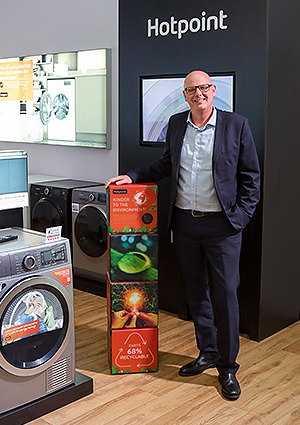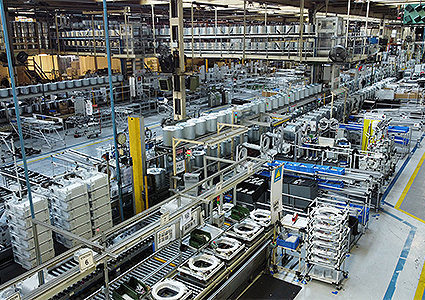
Customer care and sustainability will no doubt see Whirlpool through another century of success
Depending on where in the world you are, you may enjoy the products developed by Whirlpool’s 112 years of experience under a number of names. Whether it’s Hotpoint, Indesit, Maytag, KitchenAid, Philips, JennAir, Amana, Gladiator GarageWorks, Inglis, Estate Brastemp, Bauknecht, Ignis, or Consul, you’re in a safe pair of hands.
Manufacturing Today last sat down with the UK’s largest appliance manufacturer during the summer of 2022. So, we’re touching base with the giant once again, to hear how it’s been improving life at home over the last year or so.
“Although I’m new to this specific role, I have enjoyed 25 years working under Whirlpool,” opens James Goldsmith, Managing Director of Whirlpool UK. “There’s an enormous sense of pride that comes with knowing that, on average, one of our trusted and innovative products can be found in every home in the UK. We currently have 14 sites spread across the country, operated by 2500 employees, and have been able to leverage this scale to establish the reputation of trust and loyalty for which we’re known.
“If I cast my mind back over the last year, we’ve had an extremely competitive market with which to contend, which adds to the excitement, as it opens up plenty of potential for growth. We have seen a strong increase in our market share across most of our product categories so, despite the challenging economic environment with the cost of living crisis and high energy bills, we’re reassured that both our brand propositions and product range are based on consumers’ real needs.
“It’s all about the messaging that you deliver to your customers; and given that we have continued to grow, I am confident that ours is being received successfully. Particularly in terms of the energy saving benefits that our products present to households.”
 Commitment to sustainability
Commitment to sustainability
The nature of the appliance industry calls for manufacturers to thoroughly ensure that their new ideas are modelled on a deep understanding of how their customers live. Once consumers come to realize that a certain enterprise’s products don’t actually improve their lives at home, that’s when businesses start to fail. This, however, has never been the case for the Whirlpool family.
“Our unique and highly valued home delivery, installation, and repair services are another factor that truly set us apart,” James continues. “We employ a dedicated network of 1300 engineers and drivers to ensure that all our products continue to run smoothly once in people’s homes. They are on the road 364 days a year, visiting around two million homes per annum, which theoretically, accounts for seven percent of all UK households. Beyond this, we are the only appliance manufacturer in the UK that communicates directly with its customers at every step of their journey with us, a model that many of our competitors are now attempting to replicate.
“Sustainability is another element that sits closely to customer service at the heart of our operation. We established our first department for the environment in 1969, so it’s by no means a new venture for Whirlpool. Ever since, we have worked consistently to ensure that everything we do facilitates a more sustainable life for our employees and customers. From recycling packaging and old products to the ways in which we run our offices, distribution centers, and manufacturing sites, we are proud to be part of a global commitment.”
Customer care
Whirlpool has been modeling its approach to achieving a circular economy on the practices of its Peterborough-based headquarters. None of the waste generated on site is sent to landfill and it has even begun to convert some of its vehicles for biofuel. “We have directly removed a significant amount of single-use plastics, such as canteen cutlery, bottles, and cups, from all our UK locations,” James explains. “But our mission to reduce the company’s landfill contributions doesn’t stop there.
“To support our customer’s journeys in minimizing their own carbon footprints, we remove and recycle any packaging when delivering new products, free of charge. Furthermore, we also offer to take away any old appliances that they’re replacing. At the very least, this allows us to properly recycle these unwanted items, but in most cases, we are able to refurbish the products to give them a second life and chance to benefit somebody else.”
The organization’s warehouse in Peterborough houses almost three million different spare parts for many products that have surpassed ten years on the market. Regardless of the recent Right to Repair legislation that has been passed in the UK, this has always fallen under Whirlpool’s philosophy.
“If all your machine requires is a single replacement part, then we want to be sure that we can provide it for you,” he adds. “Whether it’s something that you can fit yourself, or requires the help of a member of our team. We’re so confident in our products that if you do decide to book one of our engineers, then for the first ten years of that product’s life, all of the spare parts will be free!
“Over the last ten years, our Peterborough reworks facility has processed more than half a million machines that, if left in consumer homes, could have ended up in landfill. We recently became the first large kitchen appliance manufacturer to receive the Planet Mark business certification, which has complemented our Eco-Vadis gold-rating status wonderfully. Both of these accreditations are a huge source of pride for our teams, as they stand as testament to the difference we are collectively making for the planet.”
In bolstering ‘customer care’ as a key pillar of its business strategy, Whirlpool places great emphasis on its ‘keeping the product in the home’ principle. Not only is this one of the reasons its brands have been so trusted for over 110 years, it also has implications for the company’s culture and approach to training.
“Keeping the product in the home is all about being there to support consumers when they need us. Whether it’s for advice on getting the most out of their purchases or to address a simpler issue that doesn’t quite require hands-on technical support,” James states.
“We believe that developing our people through proper training is the key to this, as when you deal with Whirlpool, you’re interacting with one of us, which gives our customers confidence in the knowledge and expertise they are offered during troubleshooting and general correspondence.
“Our methods of communication have really evolved over the last few years,” he says, “especially since the pandemic. We have moved on from simply offering phone calls to include social media channels, WhatsApp, and a chatbot too.
“The latter has proven to be a real asset in addressing more of the simpler queries in a faster fashion than before, but regardless, our customers can always rest assured that one of our people will be available to help them. We are continually seeking feedback to help perfect our consumers’ journeys. Everything goes towards all of our future improvements across the business, from product design to systems and services.”
 Improving lives
Improving lives
Looking forwards, Whirlpool will be continuing to finance new goods and services in line with the industry’s ever-evolving technologies. “Each year we invest more than $1 billion into research and development,” James concludes. “For example, we’re currently preparing to launch a new range of dishwashers later this year, which are more spacious but use less water and energy. Alongside this, we’ve developed a new hob that’s easier to clean.
“This year, our Hotpoint brand will be 112 years old, which is a landmark you can’t achieve without knowing what you’re doing. The trust that the general consumer base has in our brands and products is another huge part of this, and it’s something that we will continue to build upon by developing new products that truly reflect their real needs, and those of the environment. Improving life at home is not just within your four walls, but also the planet, which is everybody’s home.”
